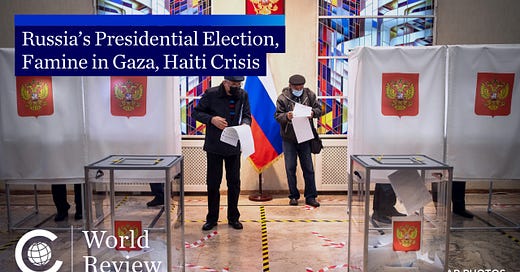World Review: Hunger in Gaza, Crisis in Haiti, "Elections" in Russia
A brief synopsis of this week's show
Each Friday morning, I host a video podcast called “World Review with Ivo Daalder” where three journalists from major news outlets around the world join me in discussing the latest global news stories of the week.
This morning, March 15, I was joined by Yasmeen Abutaleb of the Washington Post, Ravi Agrawal of Foreign Policy, and Giles Whittell of Tortoise Media.
World Review is always fascinating. I love the fact that you can get journalists from around the world to participate since zoom is the medium.
While I encourage you to watch or listen to the episode (and subscribe wherever you get your podcasts!), here are three interesting things I took away from our discussion today:
The hunger crisis in Gaza has become the number one issue in the region, with even Israel promising to “flood Gaza with aid.” The tipping point, Yasmeen argued, was the death of over 100 Palestinians among thousands of hungry people who besieged an aid convoy entering Northern Gaza two weeks ago. After this tragedy, attitudes around the world hardened. President Biden and Vice President Harris said there was “no excuse” for not getting more aid into Gaza, and countries that had been reluctant to call for a ceasefire now did so persistently, including Britain and Germany. But the deeper problem revealed by this crisis is the absence of any form of governance in the enclave, especially in the north. That was totally predictable at the outset of the war. Once you destroy the governing infrastructure in a region or country, which Israel did by going after Hamas in retaliation for the terrorist attacks of October 7, thinking through who takes over becomes an imperative—but one Israel has refused to do for more than five months now. It’s one-page “Plan for the Day After” is both completely inadequate and misses the point. Israel had no “Plan for the Day Of”—the day it destroyed the social infrastructure that kept society functioning. The hunger now affecting much of the population was an all too predictable—and predicted—outcome of that failure.
The absence of governance is equally apparent in the crisis in Haiti, which, as Ravi explained, may have exploded suddenly in recent weeks but was to be expected. Whatever date you choose—be it the failed restoration of democracy in the 1990s, the devastating earthquake of 2010, the end of the UN peacekeeping mission in 2019, or the assassination of the previous president in 2021—the lack of governance and the absence of political consensus on who rules was one day or another going to lead to the kind of devastating chaos that Haitians are suffering today. The problem is that everything has been tried before—military intervention, UN peacekeeping, massive aid projects—and nothing has worked. Haiti’s neighbors and the global community aren’t ready to do much more than try and forge a new consensus and get a new government installed. Meanwhile, the Biden administration is facing the possibility of another large influx of migrants at a time when immigration is already a hot political issue in an election year.
One man looking at this chaos and thinking he might have an answer is Vladimir Putin, who is presiding over his fifth reelection this weekend. While Russians go to the polls, everyone already knows the result: Putin will win. And there’s little doubt he will do so by a margin that is bigger than the last one. One thing to watch, Giles suggested, was how many people will show up at noon on Sunday around the country, which is when the late Alexei Navalny called on people to gather to show their quiet opposition to a sham election. For while Putin craves the legitimacy that a vote seemingly provides him, the stability of his rule depends on repression and fear rather than consent and outright support. And while today’s Russia is far from a democracy (let alone “the best democracy in the world” Putin’s spokesperson claimed it to be earlier this week), its capacity for repression is far greater than we see even today. That’s cold comfort for the people of Russia—and, indeed, for the rest of the world.
That’s it for my quick takes of this week’s episode here on America Abroad. To get the full flavor, please listen to the episode itself.





